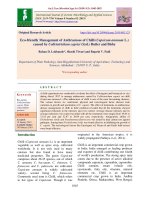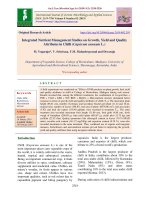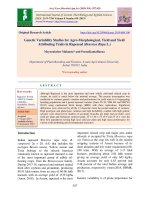Character association and path co-efficient analysis studies on yield and yield attributing characters in chilli (Capsicum annuum L.) Germplasm
Bạn đang xem bản rút gọn của tài liệu. Xem và tải ngay bản đầy đủ của tài liệu tại đây (472.21 KB, 8 trang )
Int.J.Curr.Microbiol.App.Sci (2019) 8(4): 1051-1058
International Journal of Current Microbiology and Applied Sciences
ISSN: 2319-7706 Volume 8 Number 04 (2019)
Journal homepage:
Original Research Article
/>
Character Association and Path Co-efficient Analysis Studies on Yield and
Yield Attributing Characters in Chilli (Capsicum annuum L.) Germplasm
S. Chethan Kumar*, G.S. Sahu and Chandrakanth Kamble
Department of vegetable science, College of Agriculture, Bhubaneswar, OUAT, Odisha, India
*Corresponding author
ABSTRACT
Keywords
Chilli, Phenotypic,
Genotypic,
Correlation
coefficient, Path
coefficient analysis
and yield
Article Info
Accepted:
10 March 2019
Available Online:
10 April 2019
The present study was conducted at AICRP on Vegetable Crops, Orissa University of
Agriculture& Technology, Bhubaneswar, and Odisha, India during rabi season of 2017-18
with an objective to study the correlation among the different traits in chilli genotypes for
improvement in fruit yield and yield attributing traits. Thirty four genotypes were
evaluated in a RBD with three replications. The genotypes were evaluated on the basis of
15 parameters that included growth and yield. Characters like average fresh fruit weight,
number of fruits per plant, fruit girth, and average dry fruit weight were positively and
significantly correlated to yield at genotypic and phenotypic level. However, significant
negative correlations were found with days to initial flowering, days to 50 % flowering and
leaf area. Number of fruits per plant was found to exert maximum positive direct effect on
yield followed by average fresh fruit weight, average dry fruit weight and fruit girth. Thus
direct selection through the characters would be very effective in chilli improvement
programme.
and help in the measurement of direct
influence of one variable on other.
Introduction
Chilli or hot pepper (Capsicum annuum L.)
native to new world tropics is one of the most
important vegetable and spice crop in all over
the world. In India, it is an indispensable
spice cum vegetable in every household.
Chilli belongs to family solanaceae of the
genus capsicum with eleven species and the
diploid chromosome number of this genus is
2n=2x=24.
Correlation and path coefficient analysis
provides information regarding the nature and
magnitude of various characters associations
The path analysis is a standardized partial
regression coefficient, as it measures the
direct effect of one variable upon other and
permits the separation of correlation
coefficient into components of direct and
indirect effects of a set of independent
variables on a dependent variable. Correlation
coefficient analysis measures the mutual
relationship between various plant characters
and determines the component characters on
which selection can be based for
improvement in yield of chilli crop.
1051
Int.J.Curr.Microbiol.App.Sci (2019) 8(4): 1051-1058
genotypic
level
(rg)
showed
close
correspondence for all character understudy.
Materials and Methods
Field experiments were conducted during
Rabi season of 2017-18 at All India
coordinated Vegetable Research project,
OUAT,
Bhubaneswar
for
evaluation,
genotypes performance and genetic variability
studies in chilli. The experiment was laid out
in randomized complete block design
(RCBD) with 34 genotypes collected from all
over India namely, Utkal Rashmi, BC-7-2-2,
BC-24-1, BC-7-2-1, BC-79-1, BC-27-2-2,
BC-25, BC-28, BC-40-3-1-1, BC-40-2-1-1,
BC-40-2, BC-21, BC-30, BC-7-1-1, BC-20,
BC-70-2, BC-406, BC-5-1-7, BC-78-1, BC78-1-2, BC-43, Manipur local 1, Manipur
local 2, Arka Abhir, Arka Lohit, Arka Suphul,
Byadagi Kaddi, LAM-358, LAM-620, LAM625, Anugraha, Ujwala, Pusa sadabahar and
Kunchinda local
Results and Discussion
In chilli, dry fruit yield is the economic
character. The total fruit yield is the ultimate
effect of interaction of several quantitative
characters that are highly susceptible to
changes in the environment. Hence, selection
based on yield alone may not be a very sound
proposition for effective selection. Various
component characters which are directly and
positively correlated with yield often act as
useful indicators in the selection. Thus, sound
knowledge of such associations among the
various characters particularly in relation to
total yield is of prime importance in planning
successful
and
effective
breeding
programmes. According to Robinson (1966),
correlation studies are helpful in choosing
superior genotypes from the phenotypic
expression.
The relationship of different characters with
yield at genotypic and phenotypic level is
presented in Table 1. The correlation
estimates at phenotypic level (rp) and at
The data presented in the Table 1 and Figure
1 revealed that phenotypic correlation rp
ranged from 0.236 (between fruit length and
plant height) to 0.913 (between average fresh
fruit weight to average dry fruit weight). Out
of 105 estimates of rp only 43 were found
significant and among that 23 were positively
significant, 20 were negatively significant and
all other remaining rp were recorded as nonsignificant
The genotypic correlation
coefficient
presented in Table 1 and Figure 2 value
ranged from 0.224 (between fruit length and
plant spread NS (cm) to 1.643 between plant
spread EW to plants spread NS). Out of 105 rg
estimates of rg 67 were significant and among
that 37 were positively significant, 30 were
negatively significant and all the remaining rg
were recorded as non-significant.
At phenotypic level dry fruit yield per plant
was positively and significantly correlated
with fruit length, fruit girth, average fresh
fruit weight, average dry fruit weight, number
of fruits for plant, plant height. However it
had positive and non-significant correlation
with other characters like number of primary
branches, plant spread EW and plant spread
NS.
At genotypic level dry fruit yield per plant
was positive and significantly correlated with
fruit length (0.507), fruit girth (0.646),
average fresh fruit weight (0.726), average
dry fruit weight (0. 659), number of fruits per
plant (0.767), plant height (0.530) and plants
spread NS (0.759).
However it had positive and non-significant
correlation with other characters like number
of fruits per plant and number of branches.
Significantly negative correlation was
1052
Int.J.Curr.Microbiol.App.Sci (2019) 8(4): 1051-1058
observed with days to initial flowering, days
to 50% flowering and leaf area with dry fruit
yield per plant.
In the present study direct and indirect effect
of different quantitative characters on dry
fruit yield per plant were estimated through
path analysis at phenotypic level presented in
Table 2. Number of fruits per plant had the
direct positive effect (0.544) on dry fruit yield
per plant. It exhibited high correlation with
yield (0.605) via fruit girth (0.044) and leaf
area (0.044).
The direct effect of average fresh fruit weight
(0.302) was positive and it showed significant
positive correlation with yield (0.646) via
average dry fruit weight (0.201), fruit girth
(0.075) and fruit length (0.026).
Average dry fruit weight showed positive
direct effect (0.220) on fruit yield per plant
and it exhibited high correlation with yield
(0.580) viaaverage fresh fruit weight
(0.276),fruit girth (0.065),and fruit length
(0.028) andpedicel length (0.022).
Fruit length showed positive direct effect
(0.044) on fruit yield per plant and it
exhibited high positive correlation with yield
(0.396) via average fresh fruit weight (0.180)
and average dry fruit weight (0.139).
Fruit girth shows positive direct effect (0.137)
on fruit yield per plant and it exhibited
positive correlation with yield (0.586) via
average fresh fruit weight (0.165), average
dry fruit weight (0.104) and number of seeds
per fruit (0.174).
Pedicel length showed positive direct effect
(0.086) on fruit yield per plant and it
exhibited negative correlation with yield (0.059) via number of seeds per fruit (-0.173).
Number of seeds per fruit recorded positive
direct effect (0.015) on fruit yield per plant
and it exhibited negative correlation with
yield (-0.158) via number of fruits per plant (0.191), Leaf area showed the negative direct
effect (-0.114) on yield per plant and it
exhibited negative correlation with the yield
(-0.295).
Days to flower initiation showed negative
direct effect on fruit yield per plant (-0.038)
and it exhibited negative correlation with the
(-0.243). Days to 50% flowering showed
positive direct effect (0.026) and negative
correlation with the yield (-0.175).
Plant height showed a positive direct effect
(0.033) and positive correlation with yield
(0.251). Number of branches showed positive
direct effect on dry fruit per plant (0.039) and
positive correlated with the yield (0.038)
Plant spread EW showed negative direct
effect (042) and exhibited positive correlation
with yield (0.060) Plant spread NS showed
negative direct effect (-0.002) on dry fruit
yield per plant and positive correlated with
the yield (0.136).
The perusal of results of the present
investigation exhibited that the genotypic
correlation coefficients showed higher values
for most of the variable pairs than the
phenotypic correlation coefficients presented
in Table 1, suggesting that there is a strong
inherent association between the various
characters studied.
Further, as the genotypic correlation
coefficients showed a parallel value to the
phenotypic correlation coefficients, it may be
assumed that there is not much influence of
environment in determining the association of
these attributing characters with total yield
and possibly due to a strong genitical makeup
of the evaluated materials (genotypes). Wigan
and Mather (1942) suggested that strong
positive association of character with yield
may be attributed to linkage and pleiotropy.
1053
Int.J.Curr.Microbiol.App.Sci (2019) 8(4): 1051-1058
Table.1 Phenotypic and Genotypic correlation coefficient between all pairs of quantitative characters studied in chilli
No
Character
1
Fruit Length (cm)
2
Fruit Girth (cm)
3
Pedicel Length (cm)
4
Number of Seeds/
Fruit
5
Avg. Fresh Fruit
Weight (g)
6
Avg. dry Fruit
Weight (g)
7
Number of Fruits Per
Plant
8
Days to initial
flowering
9
Days to 50%
Flowering
10
Leaf Area (cm²)
11
Plant Height (cm)
12
Primary Branches
13
Plant Spread EW
(cm)
14
Plant Spread NS
(cm)
p
g
p
g
p
g
p
g
p
g
p
g
p
g
p
g
p
g
p
g
Fruit
Length
(cm)
Fruit
Girth
(cm)
Pedicel
Length
(cm)
Number
of
Seeds/
Fruit
1
1
0.033
0.048
0.112
0.152
-0.19
-0.239*
0.338**
0.378**
-0.124
-0.142
-0.037
-0.035
1
1
1
1
1
1
Avg.
Fresh
Fruit
Weight
(g)
0.597**
0.639**
0.545**
0.599**
0.185
0.200*
0.084
0.099
1
1
Avg. dry
Fruit
Weight
(g)
Number
of Fruits
Per
Plant
Days to
initial
flowering
Days to
50%
Flowering
Leaf
Area
(cm²)
Plant
Height
(cm)
Primary
Branches
Plant
Spread
EW
(cm)
Plant
Spread
NS (cm)
Fruit
Yield Per
Plant (g)
0.633**
0.681**
0.474**
0.510**
0.253*
0.278**
0.068
0.078
0.913**
0.991**
0.036
0.025
0.320**
0.380**
-0.318**
-0.385**
-0.351**
-0.412**
0.027*
0.034
-0.056
-0.065
-0.256**
-0.318**
-0.269**
-0.335**
0.377**
0.441**
-0.251*
-0.338**
-0.226*
-0.302**
-0.19
-0.197*
-0.121
-0.147
-0.223*
-0.297**
-0.267**
-0.334**
0.323**
0.398**
-0.273**
-0.390**
-0.188
-0.241*
-0.162
-0.206**
-0.05
-0.128
0.779**
0.986**
0.191
0.187
-0.282**
-0.313**
0.612**
0.664**
0.129
0.154
-0.036
-0.051
0.041
0.034
-0.383**
-0.452**
0.323**
0.349**
0.335**
0.386**
0.236*
0.376**
0.002
0.039
0.005
-0.102
0.023
0.135
0.159
0.300**
0.181
0.288**
0.183
0.308**
-0.323**
-0.655**
-0.380**
-0.634**
-0.193
-0.266**
0.044
0.047
-0.219*
-0.238*
0.114
0.136
-0.124
-0.147
-0.076
-0.1
-0.066
-0.072
0.101
0.114
0.215*
0.326**
0.279**
0.348**
-0.022
-0.010
-0.045
0.02
0.077
0.072
-0.185
-0.642**
0.014
0.094
0.009
-0.025
0.051
0.068
0.094
-0.217*
-0.202*
-0.604**
-0.239*
-0.911**
-0.354**
-0.827**
0.088
0.224*
0.178
0.608**
-0.232*
-0.741**
0.061
0.266**
0.085
0.384**
0.091
0.402**
0.106
0.627**
-0.02
-0.426**
-0.263**
-0.665**
-0.228*
-0.652**
0.396**
0.507**
0.586**
0.646**
-0.059
-0.078
-0.158
-0.168
0.646**
0.726**
0.580**
0.659**
0.605**
0.767**
-0.243*
-0.282**
-0.175
-0.257**
-0.295**
-0.336**
1
1
-0.032
0.019
0.082
0.210*
-0.011
0.190
0.184
0.329**
-0.055
-0.126
-0.035
0.991**
0.251**
0.530**
0.038
0.034
0.06
-0.091
0.136
0.759**
1
1
1
1
1
1
1
1
1
1
p
g
p
g
p
g
p
g
1
1
1
1
1
1
1054
Int.J.Curr.Microbiol.App.Sci (2019) 8(4): 1051-1058
Table.2 Diagonal and indirect effect of component characters on yield in chilli genotypes
No
Character
1.
2.
3.
4.
5.
Fruit Length (cm)
Fruit Girth (cm)
Pedicel Length (cm)
Seeds/ Fruit
Avg. Fresh Fruit
Wt. (g)
Avg.Dry Fruit
Weight (g)
Fruits Per Plant
Days to initial
flowering
Days to 50%
Flowering
Leaf Area (cm²)
Plant Height (cm)
Primary Branches
Plant Spread EW
(cm)
Plant Spread NS
(cm)
6.
7.
8.
9.
10.
11.
12.
13.
14.
Fruit
Length
(cm)
Fruit
Girth
(cm)
Pedicel
Length
(cm)
Seeds/
Fruit
Avg
Fresh
Fruit
Weight
(g)
No.
Fruits
Per
Plant
Days to
initial
Flowering
Days to
50%
Flowering
Leaf
Area
(cm²)
Plant
Height
(cm)
Primary
Branches
Plant
Spread
EW
(cm)
Plant
Spread
NS (cm)
Fruit
Yield
Per
Plant
(g)
0.180
0.165
0.056
0.025
0.302
Avg.
Dry
Fruit
Weight
(g)
0.139
0.104
0.056
0.015
0.201
0.044
0.002
0.005
0.015
0.026
0.005
0.137
-0.026
-0.017
0.075
0.010
-0.017
0.086
-0.003
0.016
0.005
-0.002
-0.001
0.015
0.001
0.020
0.174
-0.173
-0.191
0.015
0.010
0.010
-0.014
0.010
0.009
-0.006
-0.007
0.008
-0.007
-0.005
-0.022
0.032
-0.070
-0.015
0.004
0.008
0.000
0.000
0.001
0.005
0.002
-0.009
0.005
-0.005
-0.003
0.002
-0.003
0.008
-0.001
0.000
0.000
0.000
0.000
0.000
0.000
0.396
0.586
-0.059
-0.158
0.646
0.028
0.065
0.022
0.001
0.276
0.220
-0.031
0.007
-0.004
-0.005
0.006
-0.003
-0.002
0.000
0.580
0.002
-0.011
0.044
-0.037
-0.028
0.033
-0.005
-0.004
0.008
-0.068
-0.012
-0.042
0.544
-0.066
0.005
-0.038
-0.001
0.020
0.044
-0.037
0.006
-0.011
0.004
0.008
-0.004
0.009
0.000
0.000
0.605
-0.243
-0.010
-0.037
0.028
-0.004
-0.057
-0.036
-0.027
-0.030
0.026
-0.038
-0.012
0.011
0.010
0.001
-0.175
0.008
0.010
0.002
-0.002
-0.039
0.000
-0.030
0.011
0.053
0.000
0.010
-0.016
0.002
0.000
-0.002
0.000
-0.011
0.048
-0.023
0.003
0.009
0.040
-0.015
0.011
-0.208
0.100
0.055
0.051
-0.012
0.012
-0.008
0.008
0.009
-0.010
0.007
-0.006
-0.114
0.022
0.003
0.040
-0.006
0.033
-0.001
0.003
-0.001
-0.001
0.039
0.000
0.015
-0.004
0.000
-0.043
0.000
0.000
0.000
0.000
-0.295
0.251
0.038
0.060
0.004
0.024
-0.020
0.001
0.026
0.020
0.058
0.001
-0.007
0.026
0.006
-0.002
0.002
-0.002
0.136
1055
Int.J.Curr.Microbiol.App.Sci (2019) 8(4): 1051-1058
Fig.1 Phenotypic correlation coefficient between all pairs of characters studied in chili
Fig.2 Genotypic correlation coefficient between all pairs of characters studied in chilli
In the present finding significant and high
positive correlation both at genotypic and
phenotypic level for fruit dry yield per plant,
fruit length, fruit girth, average fresh fruit
weight, average dry fruit weight, number of
fruits for plant, plant height. Low positive
correlation was observed with the number of
branches at both genotypic and phenotypic
level and plant spread NS and EW at
phenotypic level. However significant and
1056
Int.J.Curr.Microbiol.App.Sci (2019) 8(4): 1051-1058
negative correlation was observed with days
to initial flowering days to 50% flowering and
leaf area with both level. The present findings
also
corroborate
the
findings
with
Ajjappalavara et al., (2015), Smitha and
Basavaraja (2006), Sharma et al., (2010) and
Vikram et al., (2014)
Average fresh fruit weight it shows positive
and significant correlation with fruit length,
fruit girth and fruit yield per plant. However
at both phenotypic and genotypic level it was
negatively and significantly correlated with
the days to initial flowering at both
phenotypic and genotypic level. It is
positively non-significantly correlated with
pedicel length and plant height, plant spread.
The number of fruits for plants showed
positive and significant correlation with fruit
girth at both genotypic and phenotypic level.
But it is negatively and significantly
correlated with the traits like pedicel length,
number of seeds per fruit, and leaf area
genotypic, at level it is positively and nonsignificant correlate with character like fruit
length, average fresh fruit weight, number of
branches. it is evident from the observation
that when number of fruits and average fresh
fruit weight increases other component
characters had also positive relation with
them contributing to increase in yield. The
present finding is in accordance with Smitha
and Basavaraja (2016) and Sharma et al.,
(2010)
The correlations of above character suggest
that selection for these component traits
simultaneously will be effective in improving
the yield in chilli. Other pairs of characters
showing significant negative correlation value
and insignificant value either positive or
negative at phenotypic and genotypic levels,
have least importance for effective selection
based on these character.
Correlation coefficient which measures the
association between any two characters may
not give a true comprehensive picture in a
complex situation. The associations between
any two characters which are measured do not
exist by themselves alone but are part of
complicated pathway in which other traits are
also interwoven. The indirect association
becomes complex and important due to
number of variables in correlation study. In
addition to this, the mutual relationship
among different characters which may be
positive or negative make the situation
complicated. In such situation, path
coefficient analysis devised by Wright (1921)
provides a better knowledge as it reveals
direct and indirect causes of association and
permits a critical examination of specific
forces acting to produce a given correlation
and measure the relative importance of each
causal factor.
In the present study data presented in Table 2,
number of fruits per plant was found to exert
maximum positive direct effect on yield
followed by average fresh fruit weight,
average dry fruit weight and fruit girth. These
findings are in agreement with the
observations of Pujar et al., (2017), Shumbulo
et al., (2017) and Shobha et al., (2017)
Fruit length, fruit girth and average dry fruit
weight showed moderate positive indirect
effect on dry fruit yield per plant. Thus direct
selection through the characters like average
fruit weight and number of fruits per plant
would be very effective in chilli improvement
programme.
Acknowledgement
I extend my deep sense of reverence and
gratitude to AICRP on Vegetable crops,
OUAT, Bhubaneswar, and Odisha for
allowing me to take up my PG research work.
I am highly thankful to ICAR for providing
1057
Int.J.Curr.Microbiol.App.Sci (2019) 8(4): 1051-1058
me financial assistance in the form of stipend
to complete this endeavor.
References
Ajjapplavara, PS, Patil SS, Hosamani RM,
Patil AA and Ganga Prasad S.2005.
Correlation and path coefficient
analysis in chilli, Karnataka Journal
of Agricultural Sciences, 18 (3): 748751.
Pujar, UU, Tirakannanavar S., Jagadeesha
RC, Gasti VD and Sandhyarani N.
2017. Genetic variability, heritability,
correlation and path analysis in chilli
(Capsicum annuum L.), International
Journal of Pure Applied Bioscience, 5
(5): 579-586.
Smitha, RP and Basavaraja N., 2006.
Variability and correlation studies in
chilli
(Capsicum
annuum
L.),
Karnataka Journal of Agriculture
Science, 19(4):888-891.
Sharma, VK, Semwal CS and Uniyal SP.
2010. Genetic variability and character
association analysis in bell pepper
(Capsicum annuum L.), Journal of
Horticulture and Forestry, 2(3):058065.
Shobha, BV, Tembhurne, Khan H, Naik MK
and Patil BV. 2017. Genetic
variability and association analysis for
M 3 mutants in chilli (Capsicum
annuum L.), Journal of Farm
Sciences, 30(1): (16-19).
Shumbulo, A, Nigussie M and Alamerew S.
2017. Correlation and path coefficient
analysis of hot pepper (Capsicum
annuum L.) genotypes for yield and its
components in Ethiopia, Advances in
Crop Science and Technology,5(277):
DOI: 10.4172/2329-8863.1000277.
Vikram, V, Warshamana IK and Gupta M.
2014. Genetic correlation and path
coefficient studies on yield and
biochemical traits in chilli (Capsicum
annuum L.), International Journal of
Farm Sciences 4(2): 70-75.
Wright, S. 1921. Corelation and causation.
Journal of agricultural research,
20:557-585
How to cite this article:
Chethan Kumar, S., G.S. Sahu and Chandrakanth Kamble. 2019. Character Association and
Path Co-efficient Analysis Studies on Yield and Yield Attributing Characters in Chilli
(Capsicum annuum L.) Germplasm. Int.J.Curr.Microbiol.App.Sci. 8(04): 1051-1058.
doi: />
1058
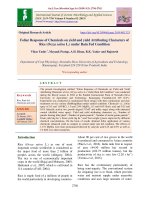
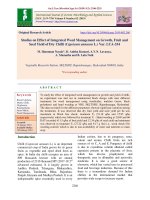
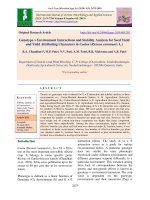

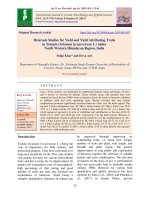
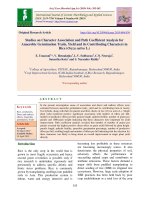
![Correlation and path coefficient analysis of fruits yield and yield attributes in okra [Abelmoschus esculentus (L.) Moench]](https://media.store123doc.com/images/document/2020_01/14/medium_ckb1578982226.jpg)
